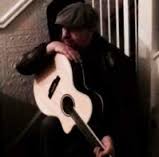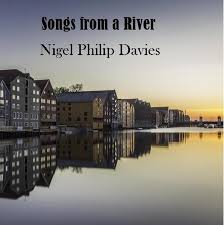One of the good (and bad) things about the internet and social media is the opportunity they’ve created for writers, artists and others to share their work with the rest of the world. Of course the quality of the output varies hugely, but that’s OK: the task of sorting the gems from the dross is a reasonable imposition on the audience given the massive choice now at its disposal.
What makes the job more rewarding than it otherwise might be is that it’s pretty much unmediated by the arts industry. The online world creates a near-level playing field between undiscovered and established talent. As far as music is concerned, pretty much anyone with a guitar, a webcam and a story to tell can find an audience—small, perhaps, but no less emotionally satisfying for that.
The music of your baby-boomer youth isn’t the music of yesterday; it’s being made fresh and new every day now by the Old Wave. Enjoy it while you can.
And no less important, either, for those of us who believe that democracy benefits from a strong popular culture, and that pop culture becomes stronger in direct proportion to the narrowness of the gap between the artist and his/her audience.
From this perspective alone, the technological revolution, in this reviewer’s opinion, has been a force for social and political good.
What about its cultural impact? Pretty mixed, as noted above. The dross is too obvious and ubiquitous to require much comment; the gems, by definition, are rare, and their value is not always apparent at first sight.
Songs from a River, the latest solo album by Nigel Phillip Davies, is one of the gems.
Real Music
Yes, I could have said that in the first paragraph, instead of waffling on about the internet. But I think the waffle is justified as it provides some context and, when it comes to Davies and other artists of his ilk, context provides a helpful introduction to content.
Davies was born at the tail end of the baby-boom generation and grew up in the 1960s and 1970s, the decades regarded by boomers (and even some of their children) as the golden age of popular music. The legacy of that age in terms of singer-songwriters can be summarised in a handful of iconic names such as Dylan, Cohen, Lennon and McCartney.
Nigel Philip Davies, locked out again…
The age came and went, musical styles changed,but the legacy endures. Davies draws on that legacy in his own approach to the dual craft of writing and performing songs. Far from being stuck in the past, however, his songs reflect a contemporary reality that doesn’t get much air time in the mass-market popular music of today or, indeed, any period.
It’s the reality of the ageing of the boomer generation: the generation that invented youth culture, now coming to terms with its own mortality.
To be fair to Davies, that is not how he portrays himself. His songs are raw, personal and immediate, with no spokesman-for-a-generation type pretentions or any sense of being consciously part of a tradition facing some sort of mid- or late-life crisis. They stand on their own as originals, in a way that validates and reaffirms the continuing relevance of the influences he’s absorbed.
The urge to put some sort of historical context around him is entirely this reviewer’s, and I do it to emphasise one important fact: Davies, unlike so many of the other older artists on YouTube and elsewhere, is not trying belatedly to fulfil the unrealised musical aspirations of his youth. He’s doing what he’s doing because it’s part of what and who he is now.
This fact alone accounts for much of the freshness and authenticity of his output.
And it’s not just Davies. There are other relatively little-known, mature and talented artists out there—such as singers/songwriters/musicians Steve Banks (Australia) and Ian Black (US), to name just two—who are putting to work the musical influences they have spent a lifetime imbibing, and combining them with a depth of personal experience (adolescent tribulations, sure, but also love, marriage, parenthood, divorce, bereavement—you name it) to create music which is both timeless and new, and satisfyingly rich in its emotional depth and honesty.
This is what, for a better descriptor, I call “real music”. It’s not the exclusive domain of certain gifted late-middle-aged men or women who’ve reached a stage of life where they are free to devote more time to their creative passions, but it’s fair to say that Davies and others like him are making a distinctive contribution to the effort to create and preserve music which is distinguished by an integrity almost alien to what typically passes as popular music in the cultural mainstream.
I might go further and say that Davies and his peers at the grey-haired end of the real music spectrum constitute an “old wave”—a sort of counterpoint in time and stage-of-life perspective to the new wave that quickly evolved out of the punk scene of the late 1970s and 1980s.
So that’s the context for Songs from a River; what about the content?
No Sense of Redemption
The cover art sets the tone: a photograph dominated front and centre by the glassy stillness of a river which reflects a row of buildings—they look like apartment blocks, but betray no sign of human occupation—that diminishes into the distant twilight like a (yes, OK) fading melody, and a melancholy one at that. It’s an image of suspense as much as peacefulness, held together by the calmness of the water and the tension of knowing that the calmness can only be temporary. The whole composition is just one breath of wind away, a single ripple, from collapse.
It’s the perfect visual metaphor for the sense of fragility that runs through many of Davies’s lyrics—the fragility not only of relationships, hopes and dreams but also, more broadly, human morality—and the feeling of alienation (symbolised by the blank exteriors of those buildings) that defines his emotional landscape.
The songs fall roughly into two groups thematically—personal relationships and social comment. The former tend to be melancholic, the latter angry. A common thread between them is the struggle of an individual to make some headway, or even just stand his ground, in a capricious and unjust world where he is engaged in an unequal struggle with the complexities of relationships, the cynicism and self-interest of the political class and his own personal faults and weaknesses.
Many are linked too by a recurring imagery of alcohol and drug abuse and barely suppressed violence—a reflection, possibly, of the hard grind of post-industrial life in Davies’s native South Wales. The effect can be oppressive, but it also adds depth and complexity to the experiences that Davies describes. The first song on the album, Oh, Marianne, No!, is one of several about lost love but there’s nothing romantic about it, despite what the plaintive chorus might suggest. It hits you between the eyes with the sense of a mind collapsing under the weight of a nightmare:
Well I’m High on nostalgia and dead in my tracks
I need medication to help me relax
I’m running on empty but I’ll fight to the last
And I can’t find my colours to nail to the mast
And the first shall be last and the last will be lost
As we count down the hours and we add up the cost
And I’m seeking salvation in a little white lie
And jumping off cliffs in the hope I can fly
And that’s just the first verse. When the second verse gets to The band has stopped playing and they’re closing the bar/We’re chasing the moon but we never get far, you feel that you’re in Tom Waits territory but without the sense, never far below the surface in Waits, that redemption might still be possible.
The next two songs, All This Time and Shadows in the Dark, explore the same thematic territory with more lyrical simplicity. They also plough the same furrow musically, with acoustic guitars and keyboards/synthetic strings (Davies on both) doing the heavy lifting, so the Latin feel of Be My Friend Tonight—a seduction song with a deceptively innocent pop sensibility—offers some pleasant and judiciously timed variety.
With She Has Gone we’re back to the lost love theme, but what a song this is: while the lyrics come close in one or two places to being a bit more poetical than I’d like, the overall effect is to distil the pathos into something genuinely moving—haunting, even, thanks to some effective reverb on Davies’s vocal. Ultimately, the lyrics more than deliver, as these examples suggest:
She brought calm, sweet release,
She gave the only thing I needed, she gave me peace…
A selfless love is hard to bear,
A selfish love is hard to share…
I wish her joy…
As she walks from my love’s shadow to the light.
In Reaper Man, Davies gets into prophetic mode, channelling post-1966 Dylan with an up-tempo, rocky preview of nuclear holocaust. The lost love theme is never far away, however, and I Miss You returns to it. Once again, Davies writes about personal relationships in a way that goes beyond the merely personal and captures the moral, ethical and even existential dimensions of love (The fading page, the burning rage, the years that disappear/The love of youth, the loss of truth, so many things I fear). Not the least of the song’s strengths are its killer chorus—something of a speciality with Davies—and a middle eight that dives unexpectedly and unsettlingly into a minor key.
Back to the political again with Achilles, a survey of late 20th and early 21st century warfare as seen through the eyes of the immortal Greek hero. Another killer chorus:
I feel just like Achilles upon the fields of Troy
While others see the hero, the hero knows the boy
I’m stranded in a foreign land hopeless and alone
Although I know I’ll die for love, the love is not my own
When, in the last verse, the chorus is modified and transplanted into the mind of a 9/11 victim at the moment of death, Davies makes you feel as though you’re standing in the Illyrian fields, too.
After that, it’s a relief to get back to the lost love theme with Crying Shame, a very satisfyingly realised song in which Davies acknowledges his own contribution to the relationship’s failure.
Street Song—about a drug dealer—is an interesting departure in that Davies takes a poem written in the 1960s by British poet Thom Gunn and almost completely remakes it, adding two verses about two characters he’s invented, Rudy and Susie, and updating Gunn’s drug references with honourable mentions for coke and crystal meth.
Back to lost love with The Search, which is something of a showstopper and one of my favourites with (true to form) an ear-worm chorus. Shades of Cinema Show by Genesis here, in the light and chiming guitar intro and some of the vocal refrains.
And then Unfinished Business, a toe-tapping upbeat country number which is easily the album’s most commercial track. If Davies doesn’t push this like mad on to US and Australian country music radio stations, he’s missing a trick. It’s the perfect package, with words and music working seamlessly together, topped off by some very tasteful and insanely hummable pedal steel guitar by the man himself.
With the final track, Have You Ever Been Lost?, Davies seems to be reaching for a big finish which, to my mind, doesn’t quite work. If it’s a failure, it’s an interesting one, hinting at musical directions he might take in the future. While it might not provide the sort of climax Davies appears to have been aiming for, it’s not an anti-climax and does nothing to detract from the album’s overall impact.
Where to Next?
If Have You Ever Been Lost? is evidence of Davies’s creative ambition, it would be interesting to see how he pursues it. Songs from a River suggests he has the talent and expertise to push the boundaries (as does his background as a session musician in the 1970s for the likes of Van Der Graaf Generator, as a jazz musician and, currently, as front man for bad-boy Welsh folk band Moongazer). No doubt, like all independent artists, his development will continue to be shaped by relatively limited resources. In Songs from a River, they play as a strength rather than a weakness: the homely production values bring to mind fond memories of the do-it-yourself ethos of punk rock—another, if somewhat downplayed, aspect of Davies’s musical heritage.
Perhaps the biggest challenge for Davies, though, will be to define his audience. While he and Moongazer have a strong following in South Wales based on live gigs and being recognisably part of the local culture, how will they develop their music and grow and diversify their audience without cutting themselves off from their roots and losing direction?
My guess is that the answer lies in communicating directly with the boomer generation and telling them something like this:
“Stop being nostalgic about the music of your youth and start listening to the Old Wave instead. Sure, John and George and Bowie and so many more are no longer with us, but there are plenty of boomer musicians out there who have been diligently cultivating their heritage all these years and are now easy to find online.
“They don’t cover the classis of the 1960s and 1970s—they write their own songs in that tradition, shaped by the realities of the early 21st century. The music of your youth isn’t the music of yesterday; it’s being made fresh and new every day now by the Old Wave. Enjoy it while you can.”


